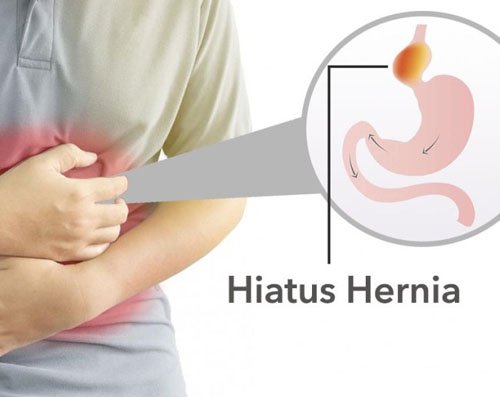
A hiatal hernia occurs when a part of the stomach protrudes through the diaphragm and into the chest. The diaphragm is a sheet of muscle that separates the abdomen from the chest.
The hernia protrudes through the diaphragm at a place called the hiatus. This is the opening in the diaphragm through which the esophagus passes. The esophagus is the tube that connects the throat to the stomach.
There are three main types of hiatus hernias: sliding, para esophageal and mixed. Most people who have a hiatal hernia have a sliding hiatal hernia.
What causes a hiatus hernia?
A hiatus hernia is usually caused by weak muscles and tissue in and around the hiatus.
In a sliding hiatus hernia, a small portion of the stomach pushes up through the diaphragm into the chest. A valve between the esophagus and the stomach also moves upwards away from the diaphragm.
What are the symptoms?
Most people with a hiatus hernia have no symptoms.
One symptom you may have is heartburn, which is an uncomfortable burning sensation, heat or pain behind the breast bone. It is common to have heartburn at night when you are trying to sleep.
If you have symptoms frequently or if they are severe, you may have gastroesophageal flux disease(GERD). A hiatus hernia can cause GERD, and people often have both conditions at the same time.
If you have pain behind your breast bone, it is important to make sure it is not caused by a heart problem. The burning sensation caused by GERD usually appears after eating. Heart pain usually feels like pressure, heaviness, weight, oppression, constriction, discomfort or dull pain. It usually occurs after you have been active.
How is hiatal hernia diagnosed?
A hiatus hernia is usually diagnosed at a doctor’s office or when you are tested for another health problem.
If you have symptoms, your laparoscopic surgeon in Delhi will ask about these. If you have severe or frequent symptoms, you may have gastroesophageal reflux disease(GERD). In this case, your doctor may do more tests or give you medications to treat GERD.
How Is Hiatal Hernia Treatment in Delhi Done?
If you have no symptoms, you do not need hernia treatment in Delhi.
If you have mild symptoms, your doctor may suggest making changes in your lifestyle and possibly taking over-the-counter medications. Here are some things to try:
- Change your eating habits.
- After eating, wait for 2 to 3 hours before bedtime. It is not a good idea to eat snacks late at night.
- Chocolate, mint, and alcohol can make GERD worse. The serelax the valve between the esophagus and the stomach.
- In some people, very spicy foods, foods that have a lot of acid(such as tomato sand oranges) and coffee can make GERD symptoms worse. If your symptoms get worse after eating certain food, you may want to stop eating that food to see if your symptoms improve.
- If you have heartburn during the night, raise the head of the bed from 6inches(15cm) to 8inches(20cm) by placing blocks under the bed frame or a foam bed under the head of the mattress. (Using additional pillows does not work).
- Lose weight, if you need to. Losing just between 5 and 10 pounds(2.3to4.5kg) can help.
If you have frequent symptoms or if the symptoms are severe, you may have GERD. Lifestyle changes may help, and your surgeon in Vikaspuri may prescribe medications. In severe cases, surgery can be done to place the hernia back in the abdomen.
